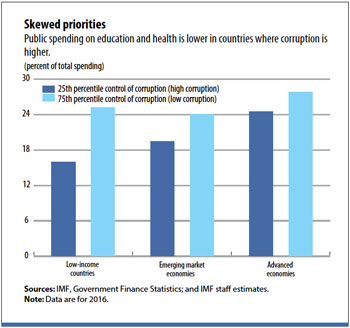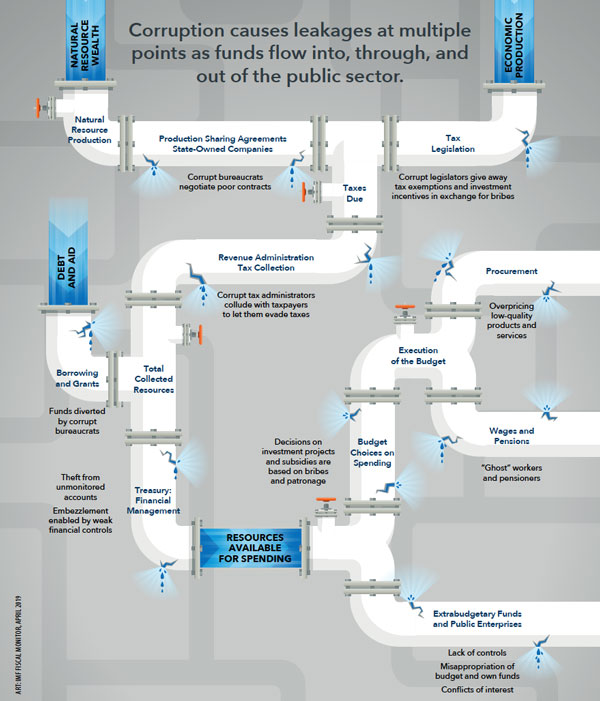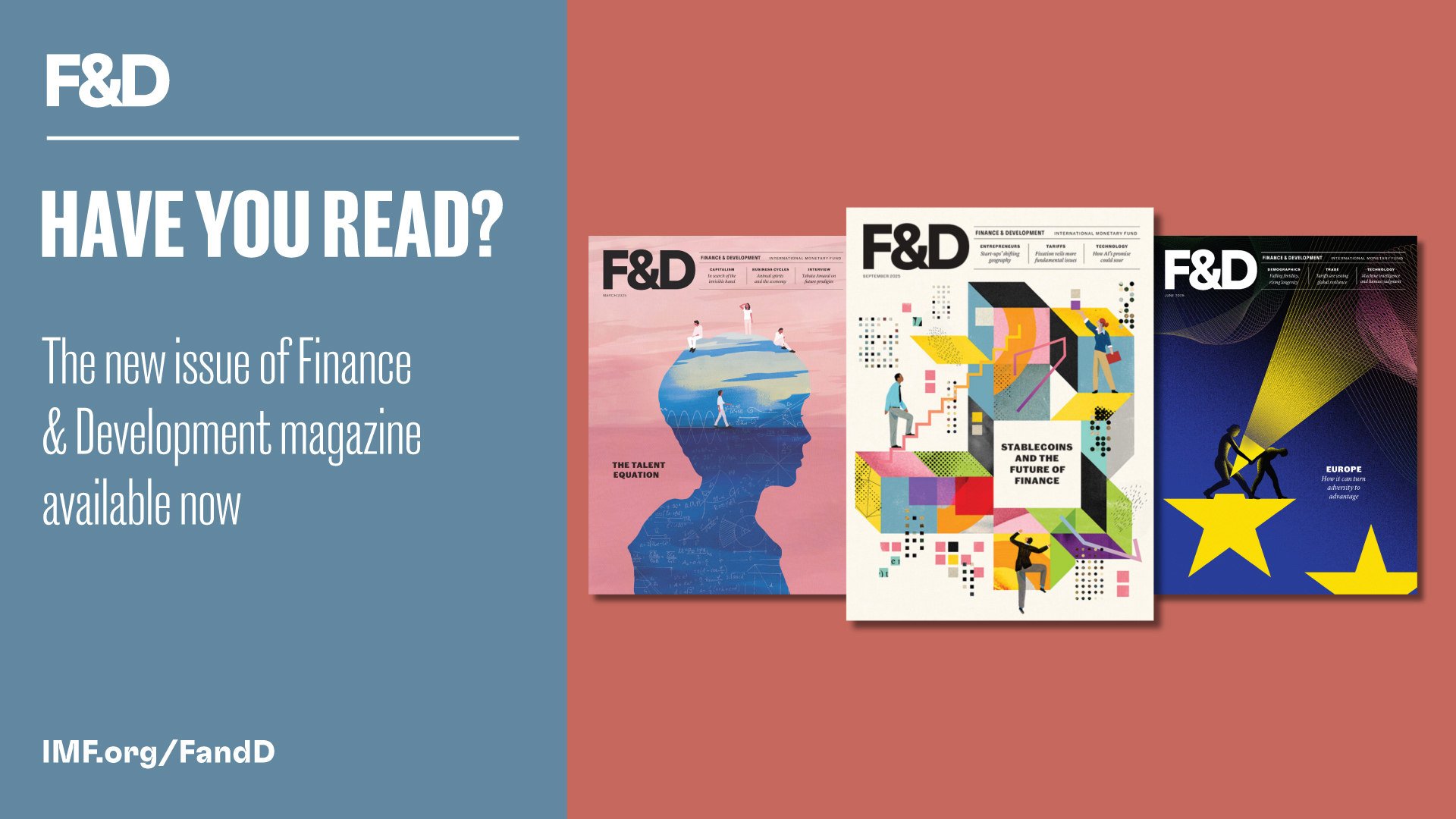Graft results in lost tax revenue, but it also takes a social toll
In 2013, Brazilian investigators working on a routine money-laundering case stumbled onto something far bigger: a bribery and bid-rigging scheme involving state-controlled oil giant Petrobras. Operation Car Wash, as the probe came to be known, discovered that some of Brazil’s largest construction and engineering firms had paid billions of dollars in bribes over a period of years to secure lucrative contracts from Petrobras. The scandal implicated dozens of government officials and politicians.
Such shady dealings aren’t limited to emerging market economies like Brazil, of course. In one spectacular case in the 1970s, politicians in Japan accepted bribes to approve contracts to buy US military aircraft. This scandal was one of the motivations for the passage of a law forbidding US companies to pay bribes abroad. But wherever it appears, corruption, or the abuse of public office for private gain, distorts the activities of the state and ultimately takes a toll on economic growth and the quality of people’s lives.
Depending on its extent, corruption can have a profoundly detrimental effect on public finances as governments collect less in tax revenue and overpay for goods and services or investment projects. But the cost of corruption is greater than the sum of lost money: distortions in spending priorities undermine the ability of the state to promote sustainable and inclusive growth. They drain public resources away from education, health care, and effective infrastructure—the kinds of investments that can improve economic performance and raise living standards for all.
Public trust diminished
How does corruption limit revenue? For one thing, it can harm the ability of governments to collect taxes in a fair and efficient way. Corrupt legislators may introduce tax exemptions or other loopholes in exchange for bribes, reducing revenue potential. And the more complex and opaque the tax system, the easier it is for officials to exercise discretion in its administration and demand bribes or kickbacks in return for a favorable outcome. An example: in a 1996 case reported by the New York Times, municipal workers allegedly accepted bribes to make it appear that unpaid taxes had actually been paid. More broadly, the distortion of tax laws and corruption of tax officials reduce public trust in the state, weakening the willingness of citizens to pay taxes.
Curbing corruption can yield significant fiscal benefits. Our research suggests that revenues are higher in countries perceived to be less corrupt; the least corrupt governments collect 4 percent of GDP more in taxes than those at the same level of economic development with the highest levels of corruption. Some countries have made progress over the past two decades, and if all countries were to reduce corruption in a similar way, they could gain $1 trillion in lost tax revenues, or 1.25 percent of global GDP.
Hot spots
While corruption can occur almost anywhere, it is most prevalent in a few hot spots. One involves natural resources, especially oil and mining. The outsized profits associated with extraction of natural resources are strong incentives for payment of bribes, or even state capture, where public policies and laws are influenced by corrupt practices to secure control over a country’s natural wealth. Indeed, resource-rich countries tend to be more corrupt because they struggle with weaker institutions and poor accountability in the use of their natural wealth.
Corruption is also prevalent among state-owned enterprises, where management may be susceptible to undue influence by civil servants and elected officials. As a result, state-owned enterprises in vital sectors like energy, utilities, and transportation are less profitable and efficient in countries with more corruption. Several high-profile corruption probes involving such firms underscore the risk of abuse of public resources, including Petrobras in Brazil, Elf Aquitaine in France (before it was privatized), and Eskom and Transnet in South Africa. Research suggests, moreover, that corruption is one of the main reasons private companies tend to be more productive than state-owned firms. Strikingly, in countries where corruption is less prevalent, the type of ownership is much less relevant to the explanation of the difference in performance between firms (Baum and others, forthcoming).
Government purchases of goods and services are another hot spot, partly because of the large amounts of money involved; public procurement accounts for 13 percent of GDP, on average, among members of the Organisation for Economic Co-operation and Development, which represents 36 advanced economies. Procurement related to public investment is particularly susceptible because big projects often have unique features, which make it harder to compare costs and easier to conceal bribes and inflate costs.

This is why grand corruption is usually associated with complex and costly projects such as construction and defense equipment. By comparison, it is harder to collect bribes on teachers’ and health care workers’ wages. As a result, spending on education and health is likely to be lower where corruption is high, making it less likely that worker productivity and living standards will improve. Among low-income countries, the share of the budget dedicated to education and health is one-third lower in more corrupt countries (see chart).
It should come as no surprise, then, that test scores tend to be lower in countries where corruption is more prevalent. While students in more corrupt countries may spend as much time in the classroom as those in other countries, the quality of instruction is worse. This is not just about spending less on education. In some countries, access to teaching jobs in public schools is influenced by bribes or connections. Teacher absenteeism is a widespread form of petty corruption in several developing economies, and a study in Brazil found evidence that where federal transfers to local governments for education spending are partially lost to corruption, dropout rates are higher and test scores worse.
Georgia’s success
Reducing corruption is a challenge, but it can bring substantial benefits. Countries that reduce corruption significantly are rewarded with surges in tax revenue. This was the case in Georgia, where in 2003 a new government launched an aggressive campaign to reduce corruption from very high levels. The result: tax revenue jumped from 12 percent to 25 percent of GDP in five years, even as tax rates were lowered.
Georgia’s success reflected a new culture of tax compliance: the share of people who felt it was never justifiable to cheat jumped from about 50 percent to almost 80 percent. Improvements in services, including lower crime rates and fewer power outages, and renewed trust in government made people more willing to pay taxes. Higher revenue also made it possible to clear wage and pension arrears, further bolstering confidence in government.
What’s the best way to combat corruption? Major political changes occasionally present opportunities for ambitious reforms and rapid improvements, as in Georgia. But in most cases, progress is likely to be gradual. Success requires political will, perseverance, and a commitment to continuously upgrade institutions over many years. To better understand the institutional characteristics that are important in promoting integrity and accountability, we studied a large set of countries. Our analysis yielded some specific lessons for policymakers:
The chances of success are greater when countries improve several mutually supporting institutions to tackle corruption. They should start with areas of higher risk—such as procurement, revenue administration, and management of natural resources—as well as effective internal controls. A fiscal governance framework also requires a professional and ethical civil service as a key pillar. The heads of agencies, ministries, and public enterprises must promote ethical behavior by setting a clear tone at the top.
Governments need to keep pace with evolving technology and opportunities for wrongdoing. Our analysis found that when governments invest in information and communication technologies and transparency increases, there are fewer opportunities to ask for bribes. For example, in Chile and Korea, electronic procurement systems have been powerful tools to improve transparency and curtail corruption.
Promoting transparency and a free press helps increase accountability. Colombia, Costa Rica, and Paraguay are using an online platform that allows citizens to monitor the physical and financial progress of investment projects. Our cross-country analysis shows that a free press enhances the benefits of fiscal transparency in curbing corruption. It is not enough to release data; it must also be widely disseminated and explained. In Brazil, the release of the results of audits affected the reelection prospects of officials suspected of misuse of public money, and the impact was greater in areas with local radio stations.
In addition to efforts to strengthen domestic institutions within countries, international cooperation is crucial. More than 40 countries have made it a crime for their companies to pay bribes to gain business abroad. Countries can also aggressively crack down on money laundering and reduce transnational opportunities to hide corrupt money in opaque financial centers.
Curbing corruption can be a daunting task, but it is necessary to restore public trust in government. The fight against corruption can also bring significant economic and social gains over time. It starts with domestic political will, continuous strengthening of institutions to promote integrity and accountability, and global cooperation.
Opinions expressed in articles and other materials are those of the authors; they do not necessarily reflect IMF policy.
References:
Baum, A., C. Hackney, P. Medas, and M. Sy. Forthcoming., ‘’Governance and SOEs: How Costly Is Corruption?” IMF Working Paper, International Monetary Fund, Washington, DC.












